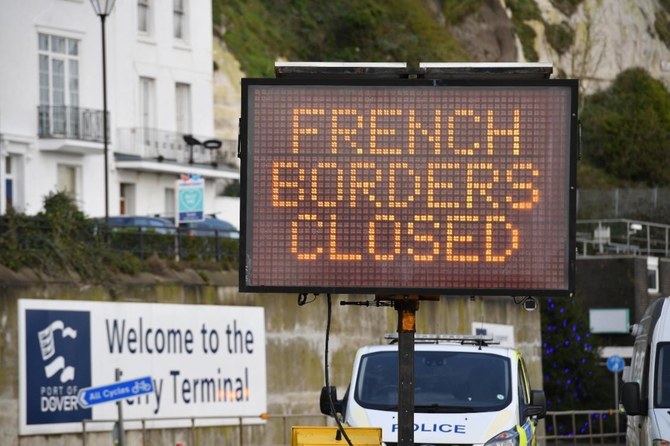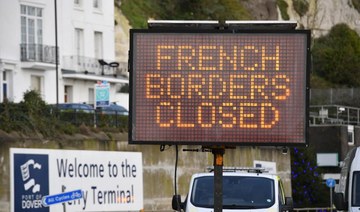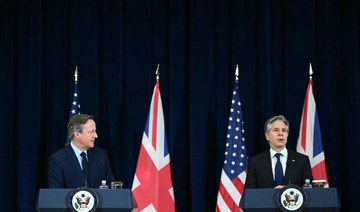PARIS: France said Thursday that it will suspend a new rule that prevents Britons from transiting through the country to reach homes elsewhere in the EU, a move that caught thousands of travellers off guard.
"During the year-end holidays" border police will show "tolerance" for Britons returning to the European Union after trips, France's Interior Ministry said.
Many Britons take the Channel Tunnel from England to France, using Eurotunnel's Shuttle service, to drive from the UK to their homes in other EU countries.
For the holidays many returned to Britain to visit family and friends without knowing that France was planning the tougher rules on non-residents.
Under stricter COVID-19 travel rules being applied since December 28, only Britons whose official primary residence is in France were to be allowed in.
"Unless they hold French residency, British citizens are now considered third country citizens and can no longer transit France by road to reach their country of residence in the EU," Eurotunnel said in a tweet late Wednesday.
The change had caused dismay among Britons who embarked on holiday trips "in good faith," the French Interior Ministry said, acknowledging the "difficulties in returning to their country of residence."
P&O Ferries issued a similar tweet warning that “only those with French residency will be permitted to enter France.”
A French interior ministry official said it had not changed its list of “compelling” reasons enabling Britons to travel to France, but had clarified their application this month by border police.
“It seems logical to consider them like all other third-country citizens, and to not allow their transit toward another EU country,” the official told AFP, asking not to be identified by name.
All tourism and professional travel from Britain has been suspended since December 18 as France tries to slow the spread of the omicron Covid variant.
On its travel advice website, the British government said France had indicated that Britons would not be allowed to transit France “unless they are traveling by air.”
“We are urgently seeking further clarification from the French government, and in the meantime advise UK nationals returning to other European countries via France to check with their carrier before traveling,” it said.
The change caught hundreds of Britons off guard as they prepared to return from family visits over the holidays.
“I’m completely lost. It doesn’t make any sense,” Fiona Navin-Jones, a school teacher who was hoping to return to Belgium, where she has lived with her family for 14 years, told AFP.
They decided to risk their Eurotunnel trip anyway on Thursday, where they were told at the terminal that getting through would depend on the border official.
“I got through so I guess I was lucky!” she said.
Eurostar, the passenger train service which many Britons use to return to homes in Belgium and elsewhere, also warned users earlier this month about the French rule change.
But it was not clear if they were being systematically applied at the three Eurostar stations in England.
One Twitter user who was turned away at the last minute this week by French police as he tried to board the Eurotunnel shuttle posted that he was able to return to Brussels by train.
“The FR customs said they had been handed the paper in the last few hours that clarified the compelling reasons rule. They even seemed a little frustrated,” wrote Roland Moore, a public relations executive in Belgium.
Paris and London have been at loggerheads over a range of thorny subjects, including fishing and illegal immigration, since Britain’s official exit from the EU nearly two years ago.
That prompted several travelers to wonder if the new French policy was the latest skirmish between the two countries.
“Reason has prevailed — but I feel so sorry for families based in Belgium with residence but no passport,” Navin-Jones said.
“French rules still stink. You can quote me.”
France suspends transit ban for Britons living in EU
https://arab.news/nfm2m
France suspends transit ban for Britons living in EU

- Many Britons take the Channel Tunnel from England to France, using Eurotunnel's Shuttle service
- P&O Ferries issued a similar tweet warning that "only those with French residency will be permitted to enter France"
OIC calls for immediate aid amid Afghan flood crisis

- Flash floods from seasonal rains in Baghlan province in northern Afghanistan
RIYADH: The Organization of Islamic Cooperation has issued an urgent appeal to its member states as well as relief organizations to provide aid to the Afghan people amid catastrophic flooding which has hit the country, Saudi Press Agency reported on Sunday.
Flash floods from seasonal rains in Baghlan province in northern Afghanistan killed at least 315 people since striking on Friday, a UN report said.
Rains also caused heavy damage in northeastern Badakhshan province and central Ghor province, officials said.
Since mid-April, floods have left about 100 people dead in 10 of Afghanistan’s provinces, with no region entirely spared, according to authorities.
Farmland has been swamped in a country where 80 percent of the more than 40 million people depend on agriculture to survive.
UK investigating Hamas’ claim that British hostage killed in Gaza

- Foreign secretary confirms viewing video
LONDON: The UK’s Foreign Office said on Sunday it was investigating a claim by Hamas that a British-Israeli hostage in Gaza had died from injuries sustained in an Israeli airstrike over a month ago.
Nadav Popplewell, 51, was captured along with his mother Channah Peri on Oct. 7 during a border incursion when the Palestinian group launched a surprise attack on Israel.
The Foreign Office said it was actively seeking more information on the matter.
Popplewell’s family has requested media outlets refrain from airing footage released by Hamas, showing him in captivity with visible injuries, the BBC reported.
The UK’s Foreign Secretary David Cameron, speaking to the BBC’s Laura Kuenssberg, confirmed viewing the video but provided no further updates on the investigation.
Cameron said: “We don’t want to say anything until we have better information.”
He described Hamas as “callous” for releasing the video and playing “with the family’s emotions in that way.”
The Foreign Office added that the department’s thoughts “are with his family at this extremely distressing time.”
The Israeli military has not issued a statement on the matter.
Israel’s military campaign in Gaza to destroy Hamas has killed over 34,900 people, the majority of whom are women and children, according to the Gaza Health Ministry.
Israel has reported that 128 hostages are unaccounted for.
UK mountaineer logs most Everest climbs by a foreigner, Nepali makes 29th ascent

- Both climbers used Southeast Ridge route to summit
- They were on separate expeditions guiding their clients
KATMANDU: A British climber and a Nepali guide have broken their own records for most climbs of Mount Everest, the world’s highest mountain, hiking officials said on Sunday.
Rakesh Gurung, director of Nepal’s Department of Tourism, said Britain’s Kenton Cool, 50, and Nepali guide Kami Rita Sherpa, 54, climbed the 8,849-meter (29,032 foot) peak for the 18th and 29th time, respectively.
They were on separate expeditions guiding their clients.
“He just keeps going and going... amazing guy!” Garrett Madison of the US-based expedition organizing company Madison Mountaineering said of the Nepali climber. Madison had teamed up with Kami Rita to climb the summits of Everest, Lhotse, and K2 in 2014.
K2, located in Pakistan, is the world’s second-highest mountain and Lhotse in Nepal is the fourth-tallest.
Lukas Furtenbach of the Austrian expedition operator Furtenbach Adventures called Cool’s feat remarkable.
“He is a fundamental part of the Everest guiding industry. Kenton Cool is an institution,” Furtenbach, who is leading an expedition from the Chinese side of Everest, told Reuters.
Both climbers used the Southeast Ridge route to the summit.
Pioneered by the first summiteers, New Zealander Sir Edmund Hillary and Sherpa Tenzing Norgay in 1953, the route remains the most popular path to the Everest summit.
Kami Rita first climbed Everest in 1994 and has done so almost every year since, except for three years when authorities closed the mountain for various reasons.
He climbed the mountain twice last year.
Mountain climbing is a major tourism activity and a source of income as well as employment for Nepal, home to eight of the world’s 14 tallest peaks, including Everest.
Nepal has issued 414 permits, each costing $11,000 to climbers for the climbing season that ends this month.
Banning UK arms exports to Israel would strengthen Hamas, UK’s Cameron says

- Cameron said he did not support an operation in Rafah in the absence of a plan to protect hundreds of thousands of civilians
LONDON: Stopping British arms sales to Israel if it launches a ground assault on Rafah in the Gaza Strip would strengthen Hamas, Britain’s Foreign Secretary David Cameron said on Sunday.
Israel ordered Palestinians to evacuate more of the southern city on Saturday in an indication it was pressing ahead with its plans for a ground attack, despite US President Joe Biden’s threat to withhold the supply of some weapons if it did so.
Cameron said he did not support an operation in Rafah in the absence of a plan to protect hundreds of thousands of civilians sheltering in the southern border city.
However, Britain was in a “completely different position” to the United States in terms of providing arms to Israel, he said, noting that the less than 1 percent of Israel’s weapons that came from Britain were already controlled by a strict licensing system.
“We could, if we chose to, make a sort of political message and say we are going to take that political step,” he told the BBC’s Laura Kuenssberg.
“The last time I was urged to do that (...), just a few days later there was a brutal attack by Iran on Israel, including 140 cruise missiles,” he added.
Cameron said the “better answer” would be for Hamas, which controls Gaza, to accept a hostage deal.
“Just to simply announce today we’re going to change our whole approach to arms exports rather than go through our careful process, it would strengthen Hamas, it would make a hostage deal less likely, I don’t think it would be the right approach,” he said.
Hamas attacked southern Israel on Oct. 7, killing some 1,200 people and taking more than 250 people hostage, according to Israeli tallies.
Israel’s military response in Gaza has killed close to 35,000 Palestinians, according to Gaza’s health ministry.
‘Completely helpless’: Afghanistan’s north struggles to get aid after deadly floods

- Thousands of houses and livestock were also wiped out by the flash floods
- Afghanistan is prone to natural disasters, considered vulnerable to climate change
KABUL: Survivors of the deadly flash floods that ripped through northern Afghanistan were still struggling without basic aid on Sunday, as the official death toll rose to over 300.
Heavy rains on Friday triggered flash floods across at least seven provinces, including Baghlan, Ghor, Badakhshan and Takhar, injuring more than 1,600 people and destroyed about 2,600 houses, according to the latest data from Afghanistan’s Ministry of Refugees.
Many people remain missing and livestock were wiped out as survivors picked through muddy, debris-littered streets and damaged buildings over the weekend, while authorities and humanitarian agencies deployed aid and rescue workers.
“All available resources are being mobilized, and relevant ministries and agencies are actively engaged in delivering urgent aid,” Mullah Abdul Ghani Baradar Akhund, Afghanistan’s deputy minister for economic affairs, told survivors in Baghlan province on Sunday, as he reassured “unwavering support” from the Taliban-led government “until their lives are restored to normalcy.”
But some people in the province, which bore the brunt of the deluges, said that aid has yet to reach them.
“We haven’t received any support from the government or aid organizations yet. Everyone comes and asks us questions, then they go back,” Ghulam Nabi, who is from the province’s Burka district, told Arab News in a phone interview.
“We lost our houses and our lives. Everything we had is under mud now. The agriculture land and livestock, our only source of livelihood, are also completely destroyed. We don’t have the basic means to cook food for ourselves.”
Since mid-April, flash flooding and other floods had left scores of people dead and destroyed farmlands across Afghanistan, a country where 80 percent of its more than 41 million people depend on agriculture to survive.
The South Asian nation is prone to natural disasters and is considered by the UN to be one of countries most vulnerable to climate change.
Aid group Save the Children said about 600,000 people, half of them children, live in the five districts in Baghlan that have been severely impacted by the recent floods.
“Lives and livelihoods have been washed away. The flash floods tore through villages, sweeping away homes and killing livestock. Children have lost everything,” Arshad Malik, the group’s country director in Afghanistan, said in a statement.
Most of the affected areas are still cut off on Sunday, inaccessible by trucks as roads and bridges were damaged by the floods, which also impacted other public infrastructure.
People were struggling to access essential health services, the World Health Organization said in a statement, as “several health facilities remain non-operational.”
Abdul Fatah Jawad, director of Ehsas Welfare and Social Services Organization, said that many of the flood survivors were still in shock.
“People are so scared and traumatized. Most houses that survived the flooding are emptied as people fear more floods. Families took refuge in school yards and deserted areas far from residential houses,” Jawad told Arab News.
He said families are in urgent need of basic goods, such as food, drinking water, medicine, tents, blankets and shelter. Since Saturday, his organization has managed to deliver cooked food for hundreds of families.
“People, particularly children, need to eat something … They also need cash to rebuild their houses and their businesses,” he said. “Some families lost everything — house, land, livestock, business. They are completely helpless.”



















